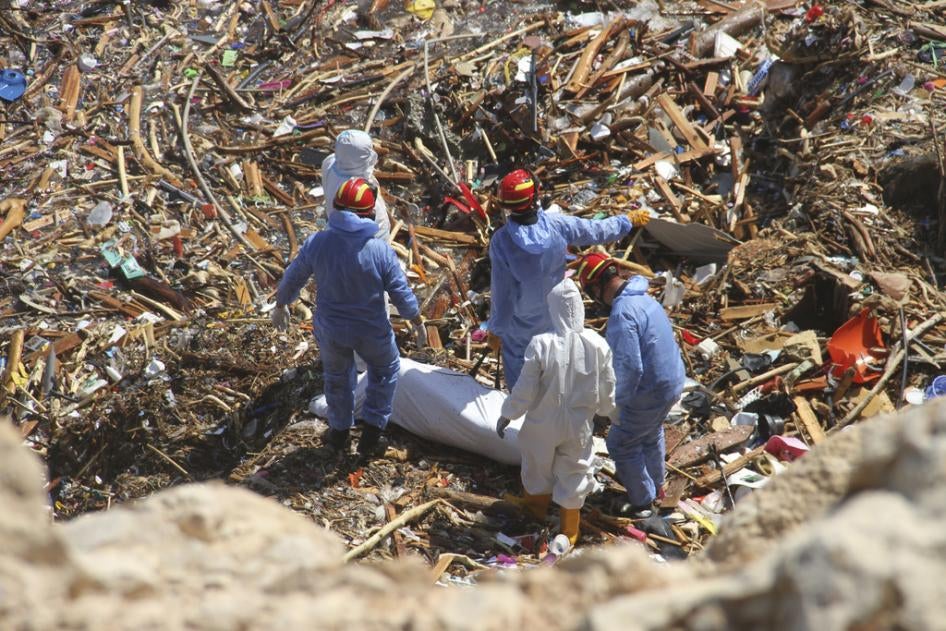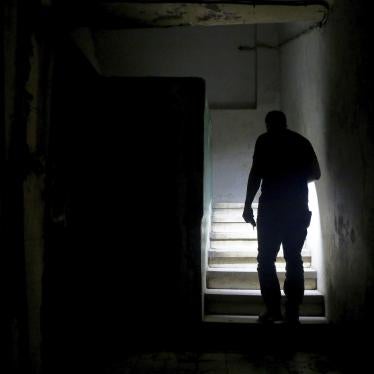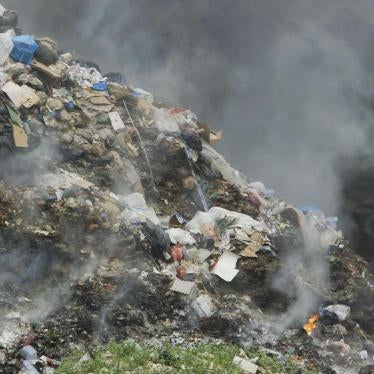(Beirut) – An independent inquiry is needed to review failings in Libyan authorities’ management of catastrophic flooding in eastern Libya in September 2023, Human Rights Watch said today. The floods caused widespread destruction, with whole neighborhoods flushed away and thousands of people killed.
Despite flood warnings up to three days before the storm made landfall on September 9, officials in the coastal city of Derna issued conflicting orders about evacuations and imposed a curfew that effectively trapped people in the path of torrents of water after the collapse of two dams. The flooding killed at least 4,352 people and displaced more than 43,000, while another 8,000 remain missing, according to the United Nations. Libya’s general prosecutor announced an investigation and Libyan authorities pledged to compensate affected communities and rebuild.
“There’s good reason to believe that the storm would have been far less deadly had the authorities responded to the danger signs by evacuating people living in the flood zone,” said Hanan Salah, associate Middle East and North Africa director at Human Rights Watch. “An independent inquiry is needed to establish what caused the massive loss of life and to pave the way for accountability.”
Libyan organizations have called for an independent international investigation, questioning the apparent failure of authorities to provide adequate maintenance of aging infrastructure, including the two dams that collapsed, despite longstanding concerns about their condition. With the conclusion of the mandate of the United Nations Independent Fact-Finding Mission on Libya in March, no international investigative mechanism is functioning for Libya.
Given prevailing impunity for past and ongoing abuses in the country and Libyan authorities’ inability or unwillingness to hold those responsible to account, the Office of the High Commissioner for Human Rights and UN experts should initiate an investigation into the human rights violations and abuses involved in the crisis, Human Rights Watch said.
Storm Daniel reached Libya on September 9, causing severe flooding the next day after two dams upstream from Derna collapsed. The torrent of water washed away neighborhoods and damaged critical sewage and water infrastructure that has yet to be repaired, according to the UN. It damaged the main hospitals, leaving only one partially functional. Schools were also affected, and a number of them in Derna continue to host displaced families, according to the UN.
The flooding also affected but caused less damage in other eastern cities such as Benghazi, Al-Bayda, Shahat, and Soussa.
Political instability and a failure to properly maintain infrastructure, including the dams, exacerbated the harm caused by the storm, a group of scholars said. They established that the early warning systems, along with the ability to deliver accurate forecasts and provide workable crisis response strategies, were “inadequate” given the lack of “cohesive governance for disaster prevention and risk management.” With global warming, the World Meteorological Organization (WMO) forecasts “more extreme rainfall events, leading to more severe flooding.”
Governance in Libya is split between two governments vying for control and legitimacy. The Tripoli-based Government of National Unity (GNU) was appointed by consensus through a UN-led process as an interim authority and administers western Libya, including Tripoli, the capital. The eastern-based government, formerly the Government of National Stability, established by the House of Representatives and aligned with the armed group the Libyan Arab Armed Forces (LAAF), controls eastern and much of southern Libya.
Libyan engineers had warned of “vulnerabilities” of the two dams that were not being addressed following flood damage in 1986. A 2022 hydrology study classified the Wadi Derna Basin as at “high risk” of flooding and found “poor management of water resources” and that “recurring floods from time to time have become a constant threat to the residents of the valley and the city of Derna.”
The study recommended that the authorities should “take immediate measures to carry out periodic maintenance of existing dams because in the event of a huge flood, the result will be disastrous on the residents of the valley and the city,” and said that the authorities should make downstream residents “aware of the danger of floods and to take all necessary measures for their safety.”
The WMO said that the Libyan National Meteorological Centre issued warnings 72 hours before the storm arrived and urged “all governmental authorities” via email and the media to “take preventive measures and to take more care and caution.” Eastern authorities responded by calling a state of emergency, and former Derna Mayor Abdelmonem al-Ghaithi on September 9 gave instructions to evacuate the neighborhoods of al-Bilad, al-Jbeilah, Sayidah Khadija, Wadi al-Naga, and the area between Derna’s western gate and the al-Karsa municipal branch office.
Media reports stated that between September 9 and 10, some residents, mostly from the coastal areas, evacuated, but early on September 10, Derna’s Security Directorate, affiliated with the eastern government, ordered a full curfew from 7 a.m. until 8 a.m. the next morning, with instructions for only bakeries, pharmacies, gas stations, and medical centers to remain open. At 1:12 a.m., the Water Resources Ministry reassured residents under curfew that all dams in Derna had been inspected and were in good condition.
But at 2:59 a.m., it announced that the dams had reached their capacity and would pose a risk of flooding for people downstream, calling for their evacuation. In fact, the dams had already collapsed at 2:40 and 2:50 am respectively and the communications network in Derna was disrupted. By that time, it was too late to evacuate residents ahead of the oncoming flood.
On September 17, the eastern-based government dismissed the entire Derna municipal council, including al-Ghaithi and the head of water resources, over their alleged role in the disaster. Protests against local authorities broke out in Derna on September 19 over their handling of the crisis, and the LAAF detained at least five men in relation to the protests, at least three of whom have been released, Derna activists told Human Rights Watch. Also on September 19, the LAAF ordered international media to leave Derna, which they did over the next two days, journalists reported.
On September 25, the general prosecutor summoned officials for questioning and opened a criminal investigation into 16 officials in relation to the management and maintenance of the dams that had collapsed. Four were reportedly in custody but are not yet charged, including Mayor al-Ghaithi, who is detained by the Criminal Investigations Department in Benghazi along with two other officials. Another official is detained in Tripoli. The general prosecutor has announced no findings of the investigation into the disaster.
Reconstruction and compensation efforts for those affected by the storm have been complicated by deep political divisions between the two governments, both of which established reconstruction funds for Derna and eastern Libya.
The eastern government said it had distributed one-time grants to 7,623 affected families in 17 municipalities in eastern Libya, paying out a total of 177,790,000 LYD (approximately US$37 million), and to 1,868 recipients in Derna, paying out a total of 103,810,000 LYD (approximately $21.6 million), as of November 29. According to media reports, the one-time grants ranged from 20,000 LYD (approximately $4,100) to 100,000 LYD (approximately $20,000), depending on the level of damage or destruction to properties.







